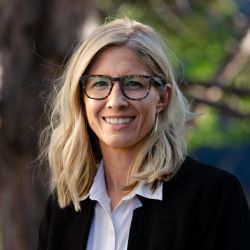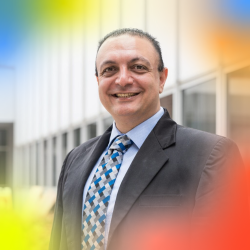In recognition of September being World Alzheimer’s Month (a campaign of Alzheimer’s Disease International), ACRP sought out commentary on a type of therapy for the disease that’s not as well known to the public as the recently approved pharmaceuticals lacanemab (Leqembi® from Eisai Inc. and Biogen) or donanemab (Kisunla™ from Eli Lilly), or the much older mematine (now marketed under many brand names worldwide).
Sharing her expertise on how music therapy may be of help in cases of dementia is Sarah Thompson, PhD, MM, currently Executive Director of the Sound Health Network at the University of California, San Francisco (UCSF), which involves leading a music and health initiative for the National Endowment for the Arts with UCSF, the National Institutes of Health (NIH), the Renee Fleming Foundation, and the Kennedy Center. She has also conducted research as a principal investigator (PI) at the University of Colorado Anschutz Medical Campus and Craig Hospital, studied user experience and product research challenges for Clinical Rhythms, and served as CEO and Chair of the Board at the nonprofit Rehabilitative Rhythms, among other accomplishments.
ACRP: It looks like your involvement with dementia research goes back at least as far as the early part of the last decade. How did you first make the connection—or what was the inspiration for your studies—between music and dementia?
Thompson: I got started in researching music and dementia because I was providing individual and group music therapy to individuals living with dementia. I have seen remarkable changes in response to music interventions. For example, I would often see individuals with dementia who were losing their language abilities suddenly join in singing a highly familiar song, surprising everyone around them. I saw many times when music provided a means for a person living with dementia to connect with their loved ones when they were no longer able to engage in other activities that they typically did together in the past. Music can be a really lovely way to honor who the person is and focus on what they are still able to do, rather than focusing on what dementia has taken away.
ACRP: How does one go about recruiting patients for music therapy trials?
Thompson: It’s very important to include the people you are hoping to help in the recruitment process. I like to get feedback on my recruitment materials and recruitment processes from individuals in the community. No matter how much experience you have doing research, any person is still making decisions based on their own experiences. There is no replacement for hearing directly from the community about how they view your materials and your approach.
ACRP: Can you tell us a little about the vision behind creating Rehabilitative Rhythms and whether conducting clinical trials were part of the organization’s activities?
Thompson: Rehabilitative Rhythms evolved out of a need for music therapy services that were specific to the neurologic community. As a research-minded clinician, I always kept up with the latest research on the groups that I was working with. Research questions also arose quite naturally out of my clinical work. I would see something during clinical work, and then go to the literature to learn more or look for an explanation. Sometimes, there was little to no literature available on the topic. When I was doing clinical work, I typically had several research questions in mind at any given time.
Rehabilitative Rhythms was involved in research for quite some time. We were a great partner for researchers because we were so embedded in the communities that they were trying to reach. We were also doing the work every day, so we knew so many practical things that put us in a great position to write realistic and repeatable protocols.
ACRP: How were you able to leverage your past experiences to serve as PI for the more recent University of Colorado digital health trial that’s mentioned in your profile, and have the results been published?
Thompson: Running a small healthcare organization allows you to build a number of skills that transfer well into research. As the CEO of a small healthcare organization, I covered many roles and balanced many priorities, such as managing staffing, monitoring the quality of the clinical work or interventions, and ensuring that we came in under budget. This is similar to being the PI of a research study. As a CEO, I also controlled the overall direction of the organization, while as PI, I controlled the scientific direction of the project. Publications are forthcoming.
ACRP: Are clinical trials currently/intended to be part of the activities undertaken by the UCSF Sound Health Network?
Thompson: No, the Sound Health Network does not undertake scientific research. It aims to increase awareness of the existing music and health literature and to provide tools and resources for music and health researchers and clinicians.
ACRP: What does the future look like for clinical research in music therapy for dementia? Is the specialty widely recognized, or what do you think it would take for it to become so?
Thompson: There has been major growth in the number of companies and researchers who are investigating the use of music in dementia care. One of the big challenges in this area is that people who are new to this work often aren’t familiar with the breadth and depth of scientific literature that informs the interventions. We need more research literature that hones in on specific aspects of the intervention so that we can improve the quality of the research. The NIH is trying to address this by putting out tools and guidance, such as the Music-Based Intervention Toolkit: https://www.nccih.nih.gov/research/the-nih-music-based-intervention-toolkit.
More Resources
Music Intact™, a digital health caregiver training program developed under Thompson’s leadership for using music to reduce challenging behaviors in Alzheimer’s.
Alzheimer’s Disease International
To mark World Alzheimer’s Day on September 21, Percussion Play is highlighting the benefits of music-making for people who have Alzheimer’s and is championing “musical conversations” being created in senior living communities.
Edited by Gary Cramer



